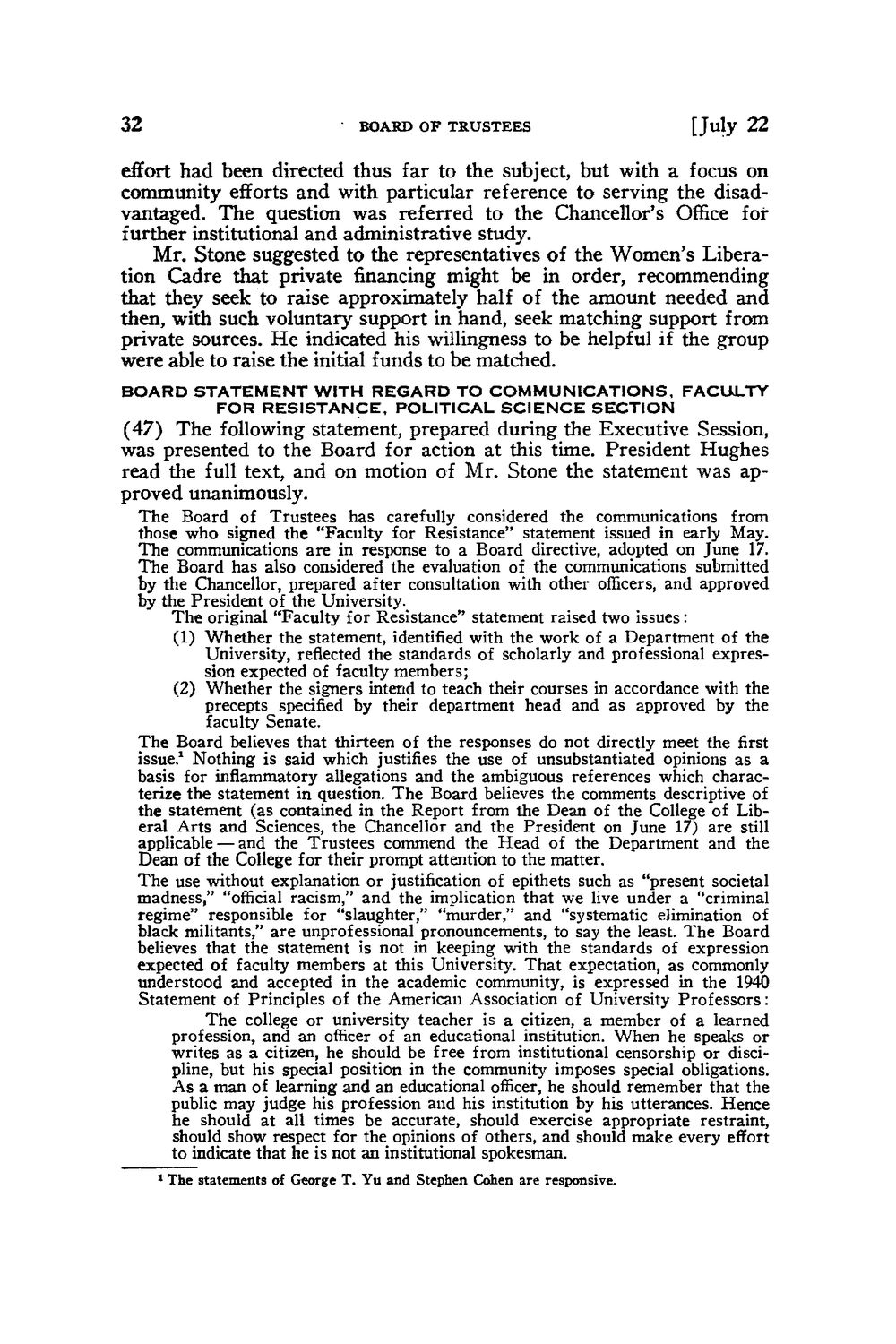| |
| |
Caption: Board of Trustees Minutes - 1972
This is a reduced-resolution page image for fast online browsing.

EXTRACTED TEXT FROM PAGE:
32 BOARD OF TRUSTEES [July 22 effort had been directed thus far to the subject, but with a focus on community efforts and with particular reference to serving the disadvantaged. The question was referred to the Chancellor's Office for further institutional and administrative study. Mr. Stone suggested to the representatives of the Women's Liberation Cadre that private financing might be in order, recommending that they seek to raise approximately half of the amount needed and then, with such voluntary support in hand, seek matching support from private sources. He indicated his willingness to be helpful if the group were able to raise the initial funds to be matched. BOARD STATEMENT W I T H REGARD TO COMMUNICATIONS, FACULTY FOR RESISTANCE, POLITICAL SCIENCE SECTION (47) The following statement, prepared during the Executive Session, was presented to the Board for action at this time. President Hughes read the full text, and on motion of Mr. Stone the statement was approved unanimously. The Board of Trustees has carefully considered the communications from those who signed the "Faculty for Resistance" statement issued in early May. The communications are in response to a Board directive, adopted on June 17. The Board has also considered the evaluation of the communications submitted by the Chancellor, prepared after consultation with other officers, and approved by the President of the University. The original "Faculty for Resistance" statement raised two issues: (1) Whether the statement, identified with the work of a Department of the University, reflected the standards of scholarly and professional expression expected of faculty members; (2) Whether the signers intend to teach their courses in accordance with the precepts specified by their department head and as approved by the faculty Senate. The Board believes that thirteen of the responses do not directly meet the first issue.1 Nothing is said which justifies the use of unsubstantiated opinions as a basis for inflammatory allegations and the ambiguous references which characterize the statement in question. The Board believes the comments descriptive of the statement (as contained in the Report from the Dean of the College of Liberal Arts and Sciences, the Chancellor and the President on June 17) are still applicable — and the Trustees commend the Head of the Department and the Dean of the College for their prompt attention to the matter. The use without explanation or justification of epithets such as "present societal madness," "official racism," and the implication that we live under a "criminal regime" responsible for "slaughter," "murder," and "systematic elimination of black militants," are unprofessional pronouncements, to say the least. The Board believes that the statement is not in keeping with the standards of expression expected of faculty members at this University. That expectation, as commonly understood and accepted in the academic community, is expressed in the 1940 Statement of Principles of the American Association of University Professors: The college or university teacher is a citizen, a member of a learned profession, and an officer of an educational institution. When he speaks or writes as a citizen, he should be free from institutional censorship or discipline, but his special position in the community imposes special obligations. As a man of learning and an educational officer, he should remember that the public may judge his profession and his institution by his utterances. Hence he should at all times be accurate, should exercise appropriate restraint, should show respect for the opinions of others, and should make every effort to indicate that he is not an institutional spokesman. 1 The statements of George T. Yu and Stephen Cohen are responsive.
| |